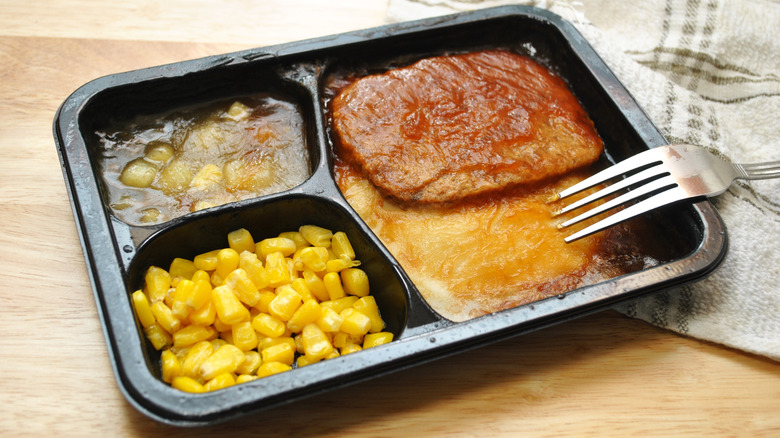Are Frozen Meals Considered Processed Food?
Frozen meals are hugely convenient on those nights when we're too busy — or tired — to cook something from scratch. While the earliest frozen foods date back thousands of years, they have evolved quite a bit over time. Today's freezer aisle meals offer a major variety of different cuisines, and only require a short trip to the microwave before they are ready to enjoy. So why isn't everyone opting for frozen dinners? Because this meal option typically contains additives and preservatives, they are considered processed food; other foods that belong in this category are snacks like chips, cookies, sodas, and even McDonald's McNuggets. Compared to items like freshly prepared meat, vegetables, and grains, there is a substantial difference where nutrition labels are concerned.
While frozen meals can contain higher levels of saturated fats, sugars, and sodium, that doesn't mean they are devoid of nutrition; the very best frozen meals offer protein (plant-based, even), whole grains, and vegetables, and they can absolutely be worked into a well-rounded diet. Certainly because they require freezer storage, the vegetables that come in these meals aren't quite as nutritious as fresh, but they are pretty dang close.
And who's to say you can't doctor up your freezer meals by adding fresh ingredients? Tossing spinach or broccoli into your microwavable mac and cheese, or adding brown rice to a frozen pot roast meal, or even just adding spices to cheaper, blander frozen meals can make you forget you're eating out of a plastic tray.
More reasons to enjoy freezer meals, despite their processed state
Microwavable meals straight from your freezer might fall under the category of processed food, but that doesn't mean you should avoid enjoying them altogether. Some studies have found that many consumers still rely on this freezer aisle staple offering — as of 2023, 60% of adults in the United States turn to pre-packaged, frozen meals reminiscent of the once-popular TV dinner at least once a week, per data collected by CivicScience.
Shoppers who are short on cash or short on time both benefit from stocking up on frozen dinners. In some cases, you'd spend about the same amount of money per serving buying a single frozen dinner, versus purchasing all the ingredients needed to make the same meal. There is also the variety to consider. In a typical grocery store, you can find a frozen meal from many different types of cuisines, that is easily accessible and budget-friendly.
Frozen meals also help cut down on food waste. When you buy fresh ingredients to make dinner from scratch and you don't end up using all of them, what happens to them? They typically languish in your fridge, go bad, and get tossed out. Freezer meals are technically safe to eat indefinitely if stored correctly, so even if you buy one and don't end up eating it right away, it'll keep for months, even years.


